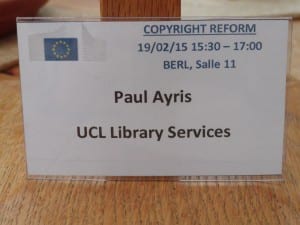Be part of UCL’s Copyright Literacy Strategy
By Christina Daouti, on 18 November 2024

AI-generated image, created in Microsoft Co-pilot on 15 November 2024.
The need for copyright literacy
Copyright is a big part of any creative activity, including research, learning, teaching and professional communications. Yet, in a short survey last year UCL staff and students rated their confidence around copyright at five out of 10. Those already engaging with UCL’s copyright support service and training express the need for a better understanding of copyright when creating and using materials such as articles, images and video. This need is even greater after the expansion of using GenAI in an already open online environment.
A copyright literacy strategy for UCL
The library is developing a copyright literacy strategy for UCL, setting a vision for different UCL communities to strengthen their skills and confidence around copyright.
We would like you to have a say in shaping this strategy. Do the strategy’s aims and proposed implementation speak to your needs? Are there gaps in understanding or support that should be addressed? The strategy document includes a feedback form inviting comments.
Your views as library professionals are important. Equally important are the views of students and staff outside LCCOS. Please consider giving us your feedback and, if you haven’t already, consider circulating this message to your contacts.
If you have any questions please contact Christine Daoutis c.daouti@ucl.ac.uk
The consultation closes on 13 December 2024. A final version of the strategy will be made live in January 2025.
Accessing the strategy document on Sway
You may need to log in with your UCL account details.
When viewing a Sway, you can turn on Accessibility view. This view displays a high-contrast style for easier reading, disables any animations, and supports keyboard navigation for use with screen readers. To turn on Accessibility view:
If you are using a mouse or touchscreen, on the More options menu (shown as three dots on the Sway toolbar), choose Accessibility view. If you’re using a screen reader, on the More options menu, when Accessibility view is selected, you hear “Displays this Sway in a high contrast design with full keyboard functionality and screen reader access to all content.”
You can also create PDFs by clicking the ‘…’ menu option in the top right corner of the Sway, clicking ‘export’ and choosing PDF.
Additional information
More on copyright skills as a critical part of information literacy can be found on the Arena MicroCPD ‘Embedding copyright literacy into your teaching’ [90 seconds] and on the 2024 UCL Education Conference post Getting comfortable with uncertainty’: developing students’ critical copyright literacy in the age of GenAI.
 Close
Close





